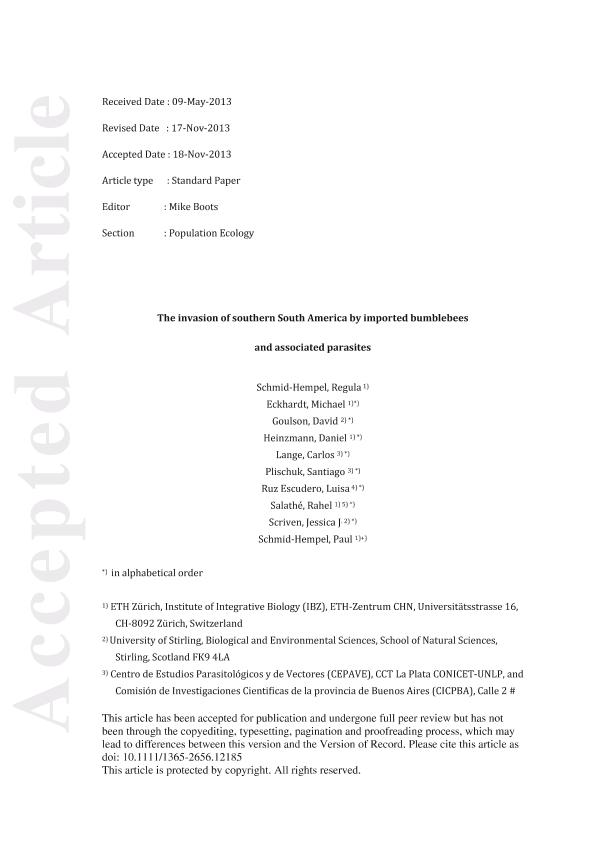Artículo
The invasion of southern South America by imported bumblebees and associated parasites
Schmid Hempel, Regula; Eckhardt, Michael; Goulson, David; Heinzmann, Daniel; Lange, Carlos; Plischuk, Santiago ; Escudero, Luisa Ruz; Salathe, Rahel; Scrive, Jessica J.; Schmid Hempel, Paul
; Escudero, Luisa Ruz; Salathe, Rahel; Scrive, Jessica J.; Schmid Hempel, Paul
 ; Escudero, Luisa Ruz; Salathe, Rahel; Scrive, Jessica J.; Schmid Hempel, Paul
; Escudero, Luisa Ruz; Salathe, Rahel; Scrive, Jessica J.; Schmid Hempel, Paul
Fecha de publicación:
07/2014
Editorial:
Wiley
Revista:
Journal Of Animal Ecology
ISSN:
0021-8790
e-ISSN:
1365-2656
Idioma:
Inglés
Tipo de recurso:
Artículo publicado
Clasificación temática:
Resumen
1. The Palaearctic Bombus ruderatus (in 1982/1983) and Bombus terrestris (1998) have both been introduced into South America (Chile) for pollination purposes. We here report on the results of sampling campaigns in 2004, and 2010–2012 showing that both species have established and massively expanded their range.
2. Bombus terrestris, in particular, has spread by some 200 km year 1 and had reached the Atlantic coast in Argentina by the end of 2011. Both species, and especially B. terrestris, are infected by protozoan parasites that seem to spread along with the imported hosts and spillover to native species.
3. Genetic analyses by polymorphic microsatellite loci suggest that the host population of B. terrestris is genetically diverse, as expected from a large invading founder population, and structured through isolation by distance. Genetically, the populations of the trypanosomatid parasite, Crithidia bombi, sampled in 2004 are less diverse, and distinct from the ones sampled later. Current C. bombi populations are highly heterozygous and also structured through isolation by distance correlating with the genetic distances of B. terrestris, suggesting the latter’s expansion to be a main structuring factor for the parasite.
4. Remarkably, wherever B. terrestris spreads, the native Bombus dahlbomii disappears although the reasons remain unclear. Our ecological and genetic data suggest a major invasion event that is currently unfolding in southern South America with disastrous consequences for the native bumblebee species.
Palabras clave:
Invasion
,
Genetics
,
Pollinator
,
Chile
,
Argentina
,
Patagonia
,
Bombus
,
Crithidia
,
Nosema
Archivos asociados
Licencia
Identificadores
Colecciones
Articulos(CEPAVE)
Articulos de CENTRO DE EST.PARASITOL.Y DE VECTORES (I)
Articulos de CENTRO DE EST.PARASITOL.Y DE VECTORES (I)
Citación
Schmid Hempel, Regula; Eckhardt, Michael; Goulson, David; Heinzmann, Daniel; Lange, Carlos; et al.; The invasion of southern South America by imported bumblebees and associated parasites; Wiley; Journal Of Animal Ecology; 83; 4; 7-2014; 823-837
Compartir



